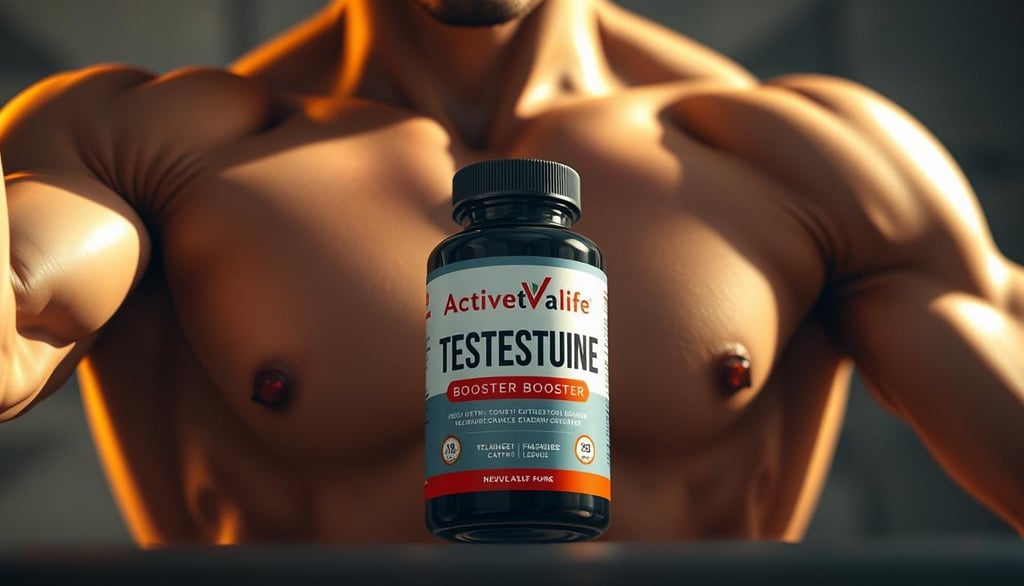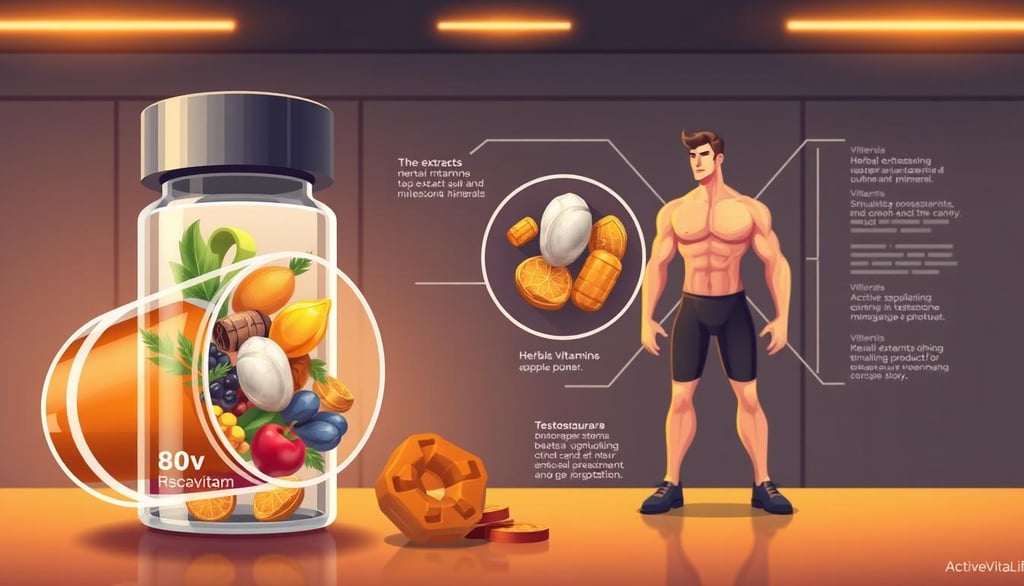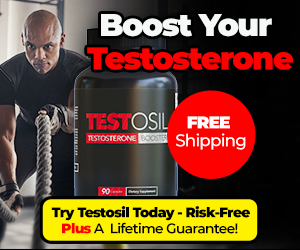Do Testosterone Boosters Work? Analysis of Pros and Cons
Do testosterone boosters work? Weigh the pros and cons. Get insights on the effectiveness of testosterone boosters for men.
MUSCLE BUILDING & WORKOUT
ActiveVitaLife
6/29/20257 min read
Do Testosterone Boosters Work? Analysis of Pros and Cons
Are over-the-counter supplements the real deal for improving vitality, or just clever marketing? Millions of men seek solutions for low energy, muscle loss, and declining performance. Yet, the effectiveness of popular enhancers remains hotly debated.
Medical experts warn that many products lack FDA approval and scientific backing. Normal hormone levels range between 300-1,000 ng/dL, but aging reduces them by 1-2% yearly after 30. While brands promise quick fixes, studies like Medical News Today’s 2025 meta-analysis challenge these claims.
Natural methods—such as strength training and balanced diets—often outperform unregulated pills. Understanding the risks and rewards helps make informed choices for long-term health.
Key Takeaways
Supplements may lack FDA verification and consistent results.
Normal hormone ranges decline naturally with age.
Medical research questions the efficacy of commercial products.
Lifestyle changes can naturally support healthy levels.
Always consult a doctor before trying new supplements.
What Are Testosterone Boosters?
Natural ingredients like fenugreek, zinc, and ashwagandha dominate the market for male wellness supplements. These over-the-counter products claim to support vitality by targeting age-related hormonal changes. Unlike prescription therapies, they’re marketed as accessible fixes for low energy or muscle loss.
In the body, this key hormone regulates muscle development, libido, and sperm production. Levels naturally decline after age 30, fueling demand for testosterone supplements. But while pharmaceutical treatments require medical oversight, OTC options lack FDA approval for safety or efficacy.
Common forms include pills and powders, often targeting men over 40. However, Medical News Today notes these formulas rely on traditional remedies, not rigorous science. Buyers should beware: regulatory gaps mean ingredients aren’t always tested for consistency or side effects.
"The supplement industry operates in a gray area—many products promise results without clinical proof."
Before trying any testosterone boosters, consult a doctor. Lifestyle changes like strength training or diet adjustments may offer safer, more sustainable benefits.
How Do Testosterone Boosters Claim to Work?
Companies claim their formulas activate natural production by targeting specific biological pathways. Popular mechanisms include:
LH stimulation: Luteinizing hormone signals the testes to release more hormones.
SHBG inhibition: Reducing sex hormone-binding globulin may increase free hormone levels.
Estrogen blockade: Some ingredients aim to limit estrogen conversion.
Marketing often ties these processes to improved gym performance and sex drive. Ads suggest faster muscle growth and heightened vitality. However, the US Anti-Doping Agency warns that such claims lack rigorous validation for athletes.
Athletic misuse risks bans, as many ingredients appear on prohibited lists. Circadian rhythm arguments also surface—brands cite higher morning levels to justify timed dosing.
"Unverified performance claims can mislead consumers into risking anti-doping violations."
US Anti-Doping Agency
Lifestyle factors like chronic stress or poor sleep are frequently blamed for low levels. While supplements promise quick fixes, their scientific backing remains debated.
Common Ingredients in Testosterone Boosters
Many men turn to supplements containing herbal extracts and minerals to address age-related vitality concerns. These formulas typically feature a blend of traditional remedies and essential nutrients. While some ingredients show promise in studies, others carry potential risks when consumed in high doses.
Fenugreek
This Mediterranean herb appears in 34% of products, often marketed for libido support. A 2018 study noted 34% improvement in vitality markers versus 28% with placebo. However, mixed research suggests possible immune suppression at high doses.
Zinc
Critical for hormone production, this mineral is included in most blends. Some formulas contain 272% of the RDA—raising toxicity concerns. Excessive intake may cause nausea and reduce HDL cholesterol levels.
Ashwagandha
An Ayurvedic herb gaining traction in Western supplements, particularly for fertility. A 2022 review found benefits for reproductive health but inconclusive data for general vitality. Typical doses range from 300-500mg daily.
Other Popular Ingredients
Secondary components often include:
Maca root: Lacks standardized dosing and may affect blood pressure
DHEA: Frequently adulterated in unregulated products
Boron: Shows potential but requires more human research
"Therapeutic doses of individual ingredients often differ dramatically from supplement blends."
Journal of Dietary Supplements
While these supplements may support healthy levels, medical guidance ensures safe usage. Always verify third-party testing for purity and potency.
Do Testosterone Boosters Work? The Scientific Evidence
Scientific scrutiny reveals mixed results for popular male wellness supplements. A 2020 study found 10.1% of products contained ingredients that actually lowered hormone output. Meanwhile, the World Journal of Men’s Health reports 90% of brands make unsupported claims.
Industry-funded research often conflicts with independent trials. For example, a 2023 meta-analysis showed placebo groups reported 22% improvement in symptoms low testosterone, matching supplement users’ experiences. Sexual performance claims may stem from psychological effects rather than biochemical changes.
Adulteration is another concern. Tests detected undeclared steroids in 14.8% of EU and US supplements. These hidden ingredients can disrupt natural testosterone levels and trigger doping violations.
"Unregulated herbal blends pose liver injury risks—some cases required hospitalization."
Australian Therapeutic Goods Administration
The Australian TGA recently banned 12 products for misleading labels and unsafe ingredients. While some formulas show modest effectiveness, unverified blends remain a gamble for long-term health.
Potential Side Effects and Risks
While supplements promise vitality, their potential side effects demand serious consideration. Unregulated blends may trigger allergic reactions, organ stress, or medication conflicts. Understanding these risks helps users make safer choices for long-term health.
Fenugreek Concerns
This herb, found in many formulas, links to leukopenia (low white blood cells) in rare cases. Allergic symptoms like rashes or breathing difficulties may also occur. VA reports note its potential to suppress immune function at high doses.
Zinc Toxicity
Chronic zinc overuse—common in supplements with 272% RDA—can cause copper deficiency. This imbalance risks anemia and side effects like nausea. The VA also ties excessive zinc to weakened immunity over time.
Other Ingredient Dangers
Maca root correlates with elevated blood pressure in animal studies. Ashwagandha has documented hepatotoxicity cases, per Australian regulators. Diabetes or thyroid medications may interact unpredictably with these herbs.
"Liver injury from herbal supplements often goes undiagnosed until severe damage occurs."
Journal of Clinical Gastroenterology
Always consult a doctor before use, especially with preexisting health conditions. Natural doesn’t always mean safe.
Natural Ways to Boost Testosterone
Optimizing vitality doesn't always require pills—simple lifestyle changes can make a significant difference. The VA confirms that losing just 7% of body weight may increase levels by 100 ng/dL. This approach often works better than unregulated supplements.
Your body responds to visceral fat reduction because fat cells convert hormones into estrogen. Targeting belly fat through balanced nutrition slows this conversion. The Mediterranean diet, rich in olive oil and fish, shows particular promise for hormonal health.
Strategic exercise routines build muscle mass while supporting natural production. Compound lifts like squats and deadlifts trigger greater hormonal responses than endurance workouts. Limit cardio sessions to 45 minutes to avoid cortisol spikes that may counteract benefits.
Sleep quality profoundly impacts hormone regulation. Studies comparing 5-hour versus 8-hour sleepers show a 15% difference in morning levels. Maintain cool, dark bedrooms and consistent bedtimes for optimal recovery.
Environmental factors like plastic toxins disrupt endocrine function. Swap plastic containers for glass and choose BPA-free products. These lifestyle changes, combined with stress management, create sustainable improvements without supplementation risks.
"Small daily habit adjustments often yield better long-term results than quick-fix supplements."
VA Health Guidelines
Zinc-rich foods like oysters and pumpkin seeds support production naturally. Unlike high-dose supplements, dietary sources provide balanced nutrition. Pair these with quality sleep and targeted lifestyle changes for comprehensive benefits.
Testosterone Boosters vs. Testosterone Replacement Therapy (TRT)
Prescription treatments and over-the-counter supplements take radically different approaches to hormonal support. Testosterone replacement therapy (TRT) includes FDA-approved gels, patches, and injections requiring medical supervision. Unlike supplements, these methods undergo rigorous testing for safety and effectiveness.
Cardiovascular risks increase significantly with TRT in obese patients. A 2022 Lancet study linked long-term therapy to 34% higher mortality in men with existing heart conditions. Regular monitoring by a doctor helps mitigate these health concerns.
Fertility preservation becomes critical during treatment. TRT often suppresses natural sperm production, requiring concurrent professional oversight. Many clinics recommend freezing sperm before starting therapy.
"TRT patients require quarterly blood tests to monitor hematocrit and PSA levels—self-treatment with supplements bypasses these safeguards."
Endocrine Society Clinical Guidelines
Cost differences are substantial. While supplements average $40 monthly, TRT runs $150-$300 plus clinic visits. Insurance often covers part of medical therapy but rarely supplements.
Consulting a doctor ensures proper diagnosis before considering either option. Lifestyle changes may address mild cases without pharmaceutical intervention, preserving long-term health.
Conclusion
Navigating hormonal health requires evidence-based decisions, not marketing hype. Research shows limited proof for supplement efficacy, while TRT carries proven risks like cardiovascular strain.
Diagnosing symptoms low testosterone demands full hormonal panels. A professional can identify root causes—whether aging, lifestyle, or medical conditions.
Prioritize sustainable fixes: strength training, sleep, and stress management. These often outperform unregulated products flagged by the FDA for safety gaps.
For persistent levels concerns, consult the Endocrine Society’s referral network. Medical oversight ensures safer, tailored solutions.
FAQ
What are the main ingredients in these supplements?
Common ingredients include fenugreek, zinc, ashwagandha, and D-aspartic acid. These compounds aim to support hormone production naturally.
Can lifestyle changes improve low levels?
Yes. Regular exercise, balanced nutrition, stress management, and quality sleep can positively influence hormone health without supplements.
Are there risks associated with over-the-counter products?
Some may cause side effects like acne, mood swings, or blood pressure changes. Always consult a healthcare professional before use.
How does replacement therapy differ from boosters?
Therapy involves medical-grade treatment for clinically low levels, while boosters are supplements that may mildly support natural production.
What symptoms indicate low hormone levels?
Reduced sex drive, fatigue, muscle loss, and mood changes may signal low levels. A blood test can confirm diagnosis.
Can these products increase muscle mass effectively?
While some ingredients may support slight improvements, significant gains require proper training and nutrition, not just supplements.
How long before seeing results from these supplements?
Effects vary, but most studies suggest at least 4-8 weeks of consistent use alongside healthy habits for noticeable changes.
Are there medical conditions that cause low levels?
Yes. Issues with the pituitary gland, obesity, diabetes, and chronic stress can negatively impact production.
Should women use these products?
Women produce small amounts naturally. Consult a doctor before using any supplement that alters hormone balance.
Do these supplements interact with medications?
Some ingredients may interfere with blood thinners, diabetes drugs, or antidepressants. Always disclose supplement use to your physician.
Read the Article: How accurate is a cortisol lab test for diagnosing hormone imbalances?
Activevitalife
Your Guide to Weight Management & Muscle Building
Contact:
Trust
contact@activevitalife.click
© 2025. All rights reserved.
Disclaimer: The information provided on this blog is for general informational and educational purposes only and should not be considered medical advice. The content is not intended to diagnose, treat, cure, or prevent any disease or health condition.








